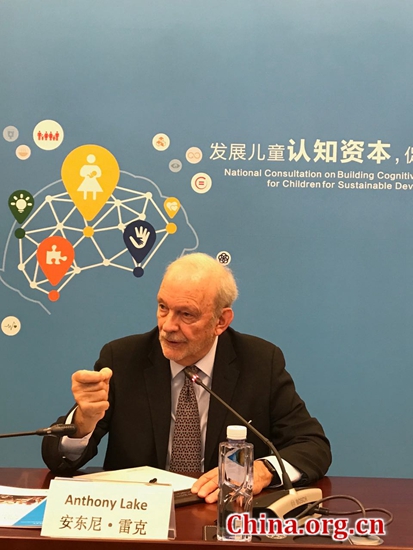|

|
|
Mr. Anthony Lake, executive director of UNICEF, talks about cognitive capital in Beijing on May 16, 2017. [Photo by Li Xiaohua/China.org.cn]
|
Investing in high-quality interventions that promote optimal brain development during a child’s formative years not only benefits the individual, but can bring enormous dividends to the future growth and prosperity of a country like China, Mr. Anthony Lake, executive director of UNICEF, declared in Beijing on May 16.
He made these remarks at a media interaction session on the sidelines of a consultation meeting discussing how social and financial investments raising cognitive capital – the capacity of people to think and learn and work together –will help sustain and grow the economies of the future.
Interventions in childhood are proven to have high rates of social, economic, and environmental returns. Statistics from the Copenhagen Consensus Center (2017) show that for every U.S. dollar invested in reducing malnutrition and promoting immunization, the returns are approximately US$45 and US$60, respectively.
Investing in breastfeeding may increase world gross national income by at least 0.49 percent or US$302 billion per year, leading to improvements in IQ, and leave no environmental footprint unlike formula feeding.
Dr. Martin Burt, founder and CEO of Fundación Paraguaya, emphasized raising awareness of the importance of the breastfeeding among mothers. “Mothers face conflicting pressures because of tiredness, nervousness and stress; only if she understands the importance of breastfeeding, will she not give formula bottles to babies,” he noted.
Mr. Lake also stressed the word needed to be spread in the community and among parents to “feed your child well, to play with your child and to protect the child from violence. None of these things cost very much, but all will add greatly to the future ability of the child, for the child to be healthy, to think clearly and to earn more, and that in turn benefits the whole society.
“This is especially important for poor children, because if they don’t get the same care and attention as well off ones, when they grow up, society will be divided by the different cognitive capacities between the poor and the well off,” he added.

